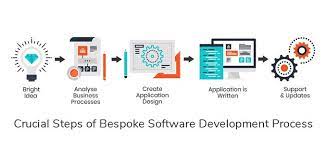In today’s fast-paced and ever-evolving digital landscape, businesses are constantly seeking innovative solutions to stay ahead of the competition. Off-the-shelf software solutions may not always address the unique challenges and requirements that each company faces. This is where bespoke software development companies come into play.
A bespoke software development company specializes in creating tailored software solutions that are custom-built to meet the specific needs of a business. Unlike off-the-shelf software, which is designed for a broad range of users, bespoke software is developed from scratch with a deep understanding of the client’s operations, workflows, and goals.
One of the key advantages of working with a bespoke software development company is the ability to have full control over the design and functionality of your software. The development process begins with detailed consultations and analysis to understand your business requirements thoroughly. The development team then works closely with you to create a solution that aligns perfectly with your unique processes and objectives.
By opting for bespoke software development, companies can gain a competitive edge by streamlining their operations, automating manual tasks, and improving overall efficiency. The tailored nature of the software ensures that it fits seamlessly into existing systems and workflows, eliminating any unnecessary complexities or redundancies.
Furthermore, as business needs evolve over time, bespoke software can easily adapt and scale accordingly. The flexibility inherent in custom-built solutions allows for future enhancements and integrations as your business grows or changes direction. This scalability ensures that your investment in bespoke software remains valuable in the long run.
Security is another critical aspect when it comes to bespoke software development. Off-the-shelf solutions are often targeted by hackers due to their widespread usage. However, with custom-built software, security measures can be implemented from the ground up to protect sensitive data and mitigate potential risks specific to your organization.
Collaborating with a reputable bespoke software development company also means gaining access to a team of experienced professionals who possess extensive knowledge in various technologies and programming languages. Their expertise allows for efficient development, rigorous testing, and ongoing support to ensure optimal performance and user satisfaction.
In conclusion, a bespoke software development company offers businesses the opportunity to harness the power of tailor-made solutions that address their unique challenges and goals. From increased efficiency and scalability to enhanced security and personalized support, the benefits of investing in bespoke software are undeniable. By partnering with a trusted development team, companies can unlock their full potential and pave the way for success in today’s digital landscape.
Frequently Asked Questions About Bespoke Software Development Companies
- What is a custom software development company?
- What is bespoke in software development?
- What is an example of bespoke software?
- Can a SaaS be bespoke?
What is a custom software development company?
A custom software development company is an organization that specializes in creating unique and tailored software solutions to meet the specific needs of clients. These companies work closely with businesses to understand their requirements, objectives, and challenges, and then develop customized software applications from scratch.
Unlike off-the-shelf software, which is pre-built and designed for a wide range of users, custom software is created to address the specific processes and workflows of a particular business. The development process typically involves collaboration between the client and the development team to ensure that the final product aligns perfectly with the client’s requirements.
Custom software development companies employ skilled professionals who possess expertise in various programming languages, frameworks, and technologies. They have experience in analyzing complex business needs and translating them into functional software solutions. These companies often follow industry best practices to ensure high-quality code, security measures, scalability, and usability.
The advantages of working with a custom software development company are numerous. Firstly, businesses can have full control over the design, features, and functionality of their software. This allows for greater flexibility in adapting to changing business needs or industry trends.
Additionally, custom software can integrate seamlessly with existing systems or databases within an organization. This eliminates data silos and improves overall efficiency by automating manual tasks or streamlining processes specific to the business.
Custom software development companies also provide ongoing support services after the initial development phase. They offer maintenance, updates, bug fixes, and technical assistance to ensure that the software remains optimized and performs reliably over time.
Security is another crucial aspect addressed by custom software development companies. By building software from scratch, these companies can implement robust security measures tailored specifically for a client’s needs. This helps protect sensitive data from potential threats or breaches.
In summary, custom software development companies play a vital role in helping businesses achieve their unique goals by creating tailored solutions that address specific challenges. Their expertise in developing customized applications ensures that businesses can optimize their processes, enhance productivity, and gain a competitive edge in their respective industries.
What is bespoke in software development?
In software development, the term “bespoke” refers to a custom or tailor-made approach to creating software solutions. Unlike off-the-shelf or pre-packaged software that is designed for a wide range of users, bespoke software is developed from scratch to meet the specific needs and requirements of a particular business or organization.
Bespoke software development involves working closely with clients to understand their unique challenges, workflows, and objectives. The development process starts with detailed consultations and analysis to gather requirements and identify key functionalities. Based on this information, the development team then designs, codes, and tests the software solution from the ground up.
The main advantage of bespoke software is its ability to be fully customized. It can be tailored precisely to fit a company’s operations, processes, and goals. This level of customization allows businesses to address their specific pain points and optimize their workflows more effectively than with off-the-shelf alternatives.
Bespoke software also offers greater flexibility and scalability compared to pre-built solutions. As business needs evolve over time or new requirements arise, bespoke software can be easily adapted or expanded. This adaptability ensures that the software remains relevant and useful as the organization grows or changes direction.
Another aspect of bespoke software development is security. Since it is built specifically for a single client, security measures can be implemented right from the start. Custom-built solutions allow for stronger data protection by addressing potential vulnerabilities specific to the organization’s infrastructure and operations.
While bespoke software development typically requires more time and resources compared to off-the-shelf options, it offers significant benefits in terms of functionality, efficiency, scalability, and security. By investing in bespoke solutions, businesses can gain a competitive edge by having software that perfectly aligns with their unique needs while providing greater control over its design, features, and future enhancements.
What is an example of bespoke software?
An example of bespoke software could be a customer relationship management (CRM) system developed specifically for a company’s unique needs. Rather than using an off-the-shelf CRM solution, which may have features that are not relevant or lack functionalities required by the business, a bespoke software development company can create a custom CRM system tailored to the organization’s processes and requirements.
This bespoke CRM software would be designed to align with the company’s specific sales, marketing, and customer service workflows. It could include features such as lead management, contact tracking, personalized communication templates, task automation, and customized reporting capabilities. The software would be developed to integrate seamlessly with existing systems and databases used by the company.
By opting for a bespoke CRM solution, the company gains full control over the design, functionality, and user experience of their software. They can ensure that it precisely matches their unique business needs and provides a competitive advantage by streamlining operations and improving customer interactions.
Moreover, as the company grows or changes its processes over time, the bespoke CRM software can be easily modified and expanded to accommodate new requirements. This flexibility allows for ongoing enhancements and optimizations as business needs evolve.
Overall, this example illustrates how bespoke software development can provide businesses with tailor-made solutions that address their specific challenges and goals effectively.
Can a SaaS be bespoke?
While Software as a Service (SaaS) typically refers to pre-built software solutions that are accessible over the internet, it is possible for a SaaS platform to incorporate bespoke elements.
In a traditional sense, SaaS solutions are designed to be standardized and scalable, catering to a wide range of users with similar needs. However, there may be instances where businesses require additional customization or unique features that are not available in off-the-shelf SaaS offerings. In such cases, a bespoke approach can be adopted to tailor the SaaS platform to meet specific requirements.
Bespoke SaaS development involves working closely with the SaaS provider or a dedicated development team to customize certain aspects of the software. This may include modifying existing functionalities, integrating with other systems, or even building entirely new modules as per the client’s needs.
By incorporating bespoke elements into a SaaS platform, businesses can enjoy the benefits of both standardized software and custom-built solutions. They can leverage the scalability and cost-effectiveness of SaaS while still having the flexibility to adapt the software to their unique workflows and processes.
It’s important to note that while some level of customization is possible in bespoke SaaS development, there may be limitations due to the nature of multi-tenancy architecture in which multiple users share the same infrastructure and codebase. The extent of customization will depend on the capabilities and flexibility provided by the SaaS provider.
In summary, while SaaS solutions are generally standardized, it is possible for businesses to incorporate bespoke elements into their chosen SaaS platform. This allows them to benefit from both off-the-shelf functionality and customized features tailored specifically to their requirements. It’s essential for businesses considering bespoke SaaS development to carefully evaluate their needs and work closely with experienced professionals or providers who can deliver the desired level of customization within the limitations of multi-tenancy architecture.


